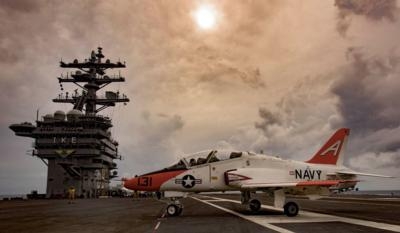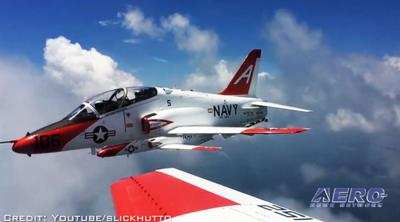Expense-Averse Service Asking if Automation Can Reduce Washouts, Control Costs
The Chief of Naval Aviation Training has started an experiment with student pilots there, selectively doing away with a segment of Carrier Qualification in a 2-year trial.

Under the program, the Chief chose a number of Naval student pilots to forgo the 1st block of carrier qualification training in their T-45C Goshawks, believing that the same education can be had later in their career when they're assigned to a Fleet Replacement Squadron. In such a case, a student pilot would come to do the bulk of their early carrier-landing mistakes in larger, advanced, and more expensive airframes, while missing out on the early education that a lighter, smaller, more analog aircraft would give them.
The experiment isn't too surprising: Teaching student pilots to land on a carrier isn't easy, and the act of landing a jet onto a heaving, windy, storm-tossed flight deck is a difficult rite of passage for naval aviators, one that some simply cannot surmount. Newer F/A-18s equipped with Precision Landing Mode have given an edge to those in the field, adding an extra dollop of justification to those in favor of putting off the carrier phase in their early training. The introduction of the PLM system to Fleet Replacement Squadrons showed that failure rates dropped from about 18% to less than 5%, thanks to the precision glideslope the new system granted. It's actually an age-old story throughout all aviation, where cash-strapped training infrastructure wonders just how much 'skill' they can appropriately replace with automation and technology - and some are worried this cost cutting measure isn't worth the trade.

Naval student pilots usually begin their carrier ops experience in their initial stages of training, getting intense, hands-on time with Landing Signal Officers as they build the habit patterns and confidence required to pull off an old-school analog carrier landing. As anyone in the military flight scene knows, every pipeline has a grueling, intimidating phase of training that looms large in the minds of students. Before they tackle it successfully, young cadets see it as purpose-built to weed out the undeserving among them, only to fondly look back on the experience once it's all in the rear view mirror. Those daunting challenges are a vital element in all flight training, since they teach students self-confidence, trust in their team, and humility in equal measure.
Lieutenant Commander Ryan Schmidt of the US Naval Institute isn't happy about the Navy's flirtation with Carrier Qual elimination. He presented his case, outlining the necessity of a student's early training with their Landing Signal Officers, deck crew, and attentive instructors. "Discontinuing training command CQ would create pilots with lower confidence, less trust in their LSOs, and less ability to handle the stress of the carrier environment. And there would be fewer safeguards to account for these shortcomings. If these risks seem nebulous, history provides plenty of lessons to make them concrete."
"While the experiment’s results are still pending and the quantifiable benefits unknown, there is a danger the Navy will minimize or dismiss the unquantifiable benefits of training command CQ under pressure to save time and money."
 ANN's Daily Aero-Linx (12.03.25)
ANN's Daily Aero-Linx (12.03.25) ANN's Daily Aero-Term (12.03.25): CrewMember (UAS)
ANN's Daily Aero-Term (12.03.25): CrewMember (UAS) NTSB Prelim: Maule M-7-235A
NTSB Prelim: Maule M-7-235A Airborne-Flight Training 12.04.25: Ldg Fee Danger, Av Mental Health, PC-7 MKX
Airborne-Flight Training 12.04.25: Ldg Fee Danger, Av Mental Health, PC-7 MKX Aero-News: Quote of the Day (12.04.25)
Aero-News: Quote of the Day (12.04.25)




